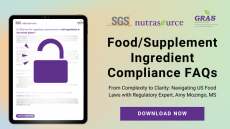FTC enforcement action targets six CBD firms over unsubstantiated claims

The action was announced on the agency’s website this morning. According to the statement, the CBD firms (two firms also market CBG products) were allegedly making a wide range of scientifically unsupported claims about their ability to treat serious health conditions, including cancer, heart disease, hypertension, Alzheimer’s disease, and others.
The six companies will be required to stop making the claims immediately. Fines were levied in all but one of the cases. The fines ranged from $20,000 to $85,000. In addition to the fines the defendants are prohibited in the future from making health benefit claims without competent and reliable scientific evidence to back them up.
FTC has dubbed the enforcement action CBDeceit, and bills it as part of the Commission’s ongoing effort to protect consumers from false, deceptive, and misleading health claims made in advertisements on websites and through social media companies such as Twitter.
“The six settlements announced today send a clear message to the burgeoning CBD industry: Don’t make spurious health claims that are unsupported by medical science,” said Andrew Smith, Director of the FTC’s Bureau of Consumer Protection. “Otherwise, don’t be surprised if you hear from the FTC.”
Allegations, settlement details
The six settlements announced today involved the following companies:
Bionatrol Health LLC
This complaint involved the named company, another called Isle Revive LLC and two former managers and owners. The complaint alleges that the defendants “claimed without substantiation that their CBD product is safe for all users, treats pain better than prescription medications like OxyContin, and prevents and treats age-related cognitive decline and chronic pain. The respondents also claimed, without scientific evidence, that CBD oil is ‘medically proven’ to improve a variety of conditions.” A $20,000 fine was levied in this case.
Epichouse LLC (First Class Herbalist CBD)
These defendants were alleged to have “promoted CBD as safe for all users, able to treat pain better than prescription medications such as OxyContin, and able to prevent a wide range of serious conditions, including cancer, diabetes, and heart disease.” A $30,000 fine was levied
CBD Meds Inc.
The defendants allegedly “made a number of false or unsubstantiated claims, including that CBD effectively treats, prevents, or mitigates serious diseases and conditions like artery blockage, cancer, glaucoma, autism, and schizophrenia, among many others. The respondents also falsely represented that some of the efficacy claims were scientifically proven or that the U.S. government has confirmed the health benefits of CBD.” No fine was levied in this case.
HempmeCBD
The defendants allegedly claimed their CBD gummies, lozenges, honey sticks, vape pens and oils “could treat or cure serious ailments like cancer-related symptoms, substance abuse, and AIDS.” FTC mandated a fine of $36,254 in the case.
Reef Industries Inc.
The Commission alleged that, “The respondents made unsubstantiated claims that CBD can prevent, cure, mitigate, or treat diseases and serious health conditions, including Alzheimer’s disease, arthritis, autoimmune disease, and irritable bowel syndrome.” The $85,000 fine levied in this case was the most required of any of the defendants.
Steves Distributing LLC
FTC alleged that this company claimed “that their CBD and CBG products are effective alternatives to prescription medications and treat a wide range of diseases and serious health conditions, including Alzheimer’s disease, cancer, and diabetes. The complaint also alleges the respondents falsely claimed that their CBD and CBG products have antibacterial properties, prevent or reduce the risk of heart attacks, strokes, and other diseases.” A $75,000 fine was levied in this case.
If defendants violate the stipulations of the settlements, each violation could carry a fine of more than $43,000, the Commission said.



















